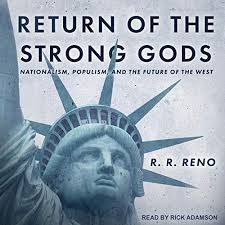
My selection this month is Return of the Strong Gods by R.R. Reno. As an analysis and diagnosis of how we got into the mess we are in, this book is simply superb. Not only is it superb, but it is superb in surprising ways. In other words, this is not a tired retread of standard conservative laments of the sort you have no doubt heard before.
Reno’s basic thesis is that when it comes to cultural analysis, there is a more fundamental division than the categories of left/right, with that more fundamental division being that of closed/open societies, with the former presided over by “strong gods,” and the latter by “weak gods.” He argues that the first half of the 20th century was profoundly traumatic for Western culture, with two back-to-back world wars. Coming out of those wars, a consensus developed in the West, maintaining that the basic cause of such carnage was the problem of having believed things too strongly, being too attached to our nation or people, allowing for the “authoritarian personality,” and so forth. Strong gods led to savage wars, in other words. And so this post-war consensus insisted on a liberal or open society, governed by the “weak gods.”
Reno doesn’t go into this, but I would argue that you can never rid yourselves of the strong gods—you can only hide them. Our culture still has strong gods, and you can still get hauled off for wrongthink, but we have to pretend to ourselves that this is not actually happening. But that is another issue.
He argues that the rise of populism, whether of the left or right, is an indication that human beings do not thrive under the care of the weak gods, and so they are demanding a return to the strong ones. Reno acknowledges in numerous ways that the strong gods can be terrible, and that we should do everything in our power to avoid a resurrection of Chemosh—but the problem with wicked strong gods is the wickedness, not the strength.
The image that came to my mind was that of a car that encountered problems because all the lug nuts on the tires were cinched way too tight. So in order to keep that from happening again, the owner loosened all the lug nuts so there was just a thread or two of purchase, and then went blowing down the road. That’s us, Western culture, off by the side of the road.
This book was really informative, and I really appreciated it. Right near the end, at the point where you might be looking for answers, Reno doesn’t really supply them. He does point to what we “need to get back to,” which is (obviously) a return to the strong gods of the more wholesome sort. But how that might happen—and this is my one criticism of the book—is largely left up to the devotees of the strong gods, who by a return to wholesome faith supply these gods with all the strength they need. But that actually backwards. Shouldn’t the strong gods intervene to raise us from the dead? Instead of us resurrecting them?
Still, even with that flaw in the last few pages, this remains a marvelous book.
“God shall arise and by His might, put all His enemies to flight . . .” (Ps. 68).

